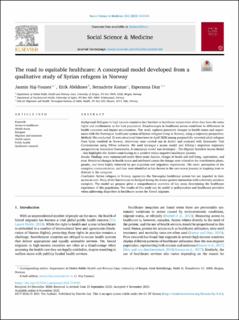| dc.contributor.author | Haj-Younes, Jasmin | |
| dc.contributor.author | Abildsnes, Eirik | |
| dc.contributor.author | Kumar, Bernadette. N | |
| dc.contributor.author | Perez, Esperanza Diaz | |
| dc.date.accessioned | 2022-02-01T07:45:22Z | |
| dc.date.available | 2022-02-01T07:45:22Z | |
| dc.date.created | 2021-11-21T13:27:57Z | |
| dc.date.issued | 2022 | |
| dc.identifier.issn | 0277-9536 | |
| dc.identifier.uri | https://hdl.handle.net/11250/2976151 | |
| dc.description.abstract | Background
Refugees in high-income countries face barriers to healthcare access even when they have the same rights and entitlements as the host population. Disadvantages in healthcare access contribute to differences in health outcomes and impact acculturation. This study explores perceived changes in health status and experiences with the Norwegian healthcare system of Syrian refugees living in Norway, using a trajectory perspective.
Methods
We conducted 15 semi-structured interviews in April 2020 among purposefully recruited adult refugees from Syria resettled in Norway. Interviews were carried out in Arabic and analysed with Systematic Text Condensation using NVivo software. We used Lévesque's access model and Edberg's migration trajectory perspective as theoretical frameworks. A conceptual model was developed – The Migrant Sensitive Access Model - that highlights the factors contributing to a positive versus negative healthcare journey.
Results
Findings were summarized under three main themes: changes in health and well-being, expectations, and trust. Perceived changes in health status and attributed causes for change were related to the resettlement phase, gender, and were highly informed by pre-migration and migration experiences. The users’ perception of the caregiver, communication, and time were identified as key factors in the care-access journey in inspiring trust or distrust in the caregiver.
Conclusion
Syrian refugees in Norway appreciate the Norwegian healthcare system but are impeded in their access to care. Many of the barriers can be bridged during the doctor-patient interaction with a diversity sensitive caregiver. The model we propose gives a comprehensive overview of key areas determining the healthcare experience of this population. The results of this study can be useful to policymakers and healthcare providers when addressing disparities in healthcare access for forced migrants. | en_US |
| dc.language.iso | eng | en_US |
| dc.publisher | Elsevier | en_US |
| dc.rights | Navngivelse 4.0 Internasjonal | * |
| dc.rights.uri | http://creativecommons.org/licenses/by/4.0/deed.no | * |
| dc.title | The road to equitable healthcare: A conceptual model developed from a qualitative study of Syrian refugees in Norway | en_US |
| dc.type | Journal article | en_US |
| dc.type | Peer reviewed | en_US |
| dc.description.version | publishedVersion | en_US |
| dc.rights.holder | Copyright 2021 The Authors | en_US |
| dc.source.articlenumber | 114540 | en_US |
| cristin.ispublished | true | |
| cristin.fulltext | original | |
| cristin.qualitycode | 2 | |
| dc.identifier.doi | 10.1016/j.socscimed.2021.114540 | |
| dc.identifier.cristin | 1956946 | |
| dc.source.journal | Social Science and Medicine | en_US |
| dc.identifier.citation | Social Science and Medicine. 2022, 292, 114540. | en_US |
| dc.source.volume | 292 | en_US |

